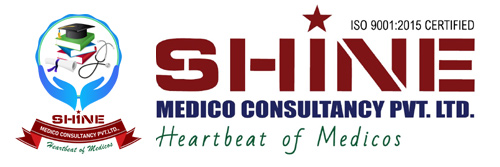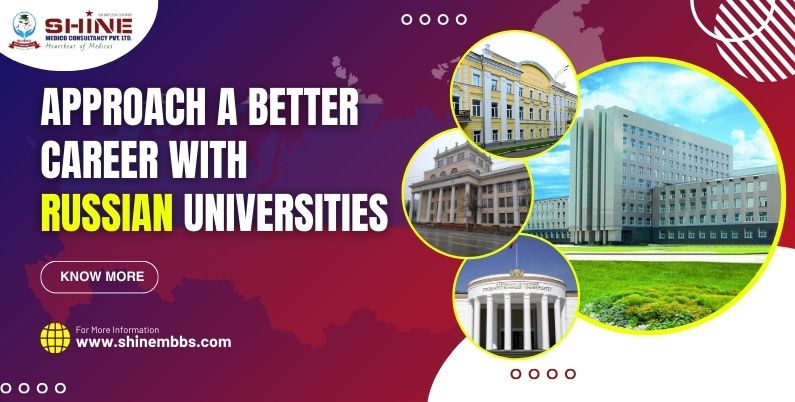Higher education is key to career success, providing the knowledge, skills, and connections needed for professional growth. As education around the world changes, Russian universities are becoming an attractive option for students everywhere. They offer high-quality education, a wide range of academic programs, and affordable study opportunities. This article discusses the importance of higher education and how to Approach a Better MBBS Career with Russian Universities and the promising career opportunities they provide.
Pursue a Brighter MBBS Future with Russian Universities
The Importance of Higher Education for Career Success
Higher education is not just about gaining knowledge; it’s a transformative experience that develops critical thinking, problem-solving skills, and adaptability. Graduates with higher education degrees often have better job prospects, higher salaries, and more job stability. A university degree also shows employers that a candidate is dedicated, disciplined, and capable of handling complex challenges. In a competitive job market, having the right education can make the difference between an average career and a successful one.
Overview of Russian Universities: Reputation, Education Quality, and Global Recognition
Russian universities have a long-standing tradition of academic excellence. They’re known for their high academic standards, experienced faculty, and ground breaking research. Institutions such as
Kabardino Balkarian State University, Kemerovo State Medical University, and Novgorod State University have gained global recognition for their advancements in various fields like science, technology, and medicine. The Russian higher education system is constantly progressing, adopting modern teaching techniques and high-quality facilities to maintain global standards.
Advantages of studying MBBS at Russian universities:
Cost-effective Education
One of the important aspects of studying in Russia is its affordability. Tuition fees at Russian universities are much lower than those in Western Europe or North America, yet the quality of education remains high. Moreover, living expenses in Russia are relatively inexpensive, making it a financially available choice for many international students.
A wide range of academic choices
Russian universities provide wide range of academic programs across various fields. Whether interested in natural sciences, humanities, or medicine, students can find programs tailored to their interests and career goals. The curriculum aims to cover all bases, combining theory with practical experience to give students a well-rounded education.
Global Experience
Studying in Russia offers students valuable international experience. With a diverse student population from different countries, students can build cross-cultural skills and global connections crucial in today’s interconnected world. Additionally, many Russian universities provide programs taught in English, opening oppurtunities for non-Russian speakers.
High Standard of Medical Education
Russian medical universities maintain high educational standards, combining rigorous academic training with practical clinical experience. State-of-the-art laboratories, modern teaching hospitals, and experienced faculty contribute to a comprehensive learning environment.
Practical Training Opportunities
Hands-on training is fundamental to medical education in Russia. Students acquire practical experience through clinical rotations, and direct patient care, preparing them with the skills and confidence necessary for success in their medical careers.
Exploring MBBS Programs in Russian Universities
Accreditation and Recognition
Russian medical universities hold global recognition and accreditation from major international medical bodies like the World Health Organization (WHO) and the Medical Council of India (MCI). This guarantees that graduates can pursue medical practice in different countries, contingent upon fulfilling local licensing criteria.
Curriculum
The MBBS program in Russian universities is carefully designed to encompass vital medical sciences, clinical training, and practical experience. Initially, students concentrate on fundamental topics like anatomy, physiology, and biochemistry. Later years prioritize clinical rotations in hospitals, enabling students to put their knowledge into practice in real-world situations.
Eligibility Requirements
The eligibility criteria for MBBS programs in Russia are simple. International students typically need to have completed high school with a strong background in science subjects. Additionally, proficiency in English or Russian (depending on the medium of instruction) is required. Some universities may also require entrance exams or interviews.
Life as an International Student in Russia
Accommodation
Russian universities provide a range of accommodation options for international students, including on-campus dormitories and off-campus housing. University dormitories are budget-friendly and offer an excellent chance to connect with peers from different countries.
Cost of Living
Living expenses in Russia are relatively inexpensive compared to Western nations. Essentials like food, transportation, and entertainment are affordable, helping students better manage their finances. they provide more job prospects and amenities.
Cultural Adaptation
Adjusting to life in a new country can be tough, but Russian universities offer support services to assist international students. Orientation programs, cultural events, and student organizations create chances to meet people and build friendships. Embracing the local culture and being open to new experiences will enhance your time in Russia.
Health and Safety
Russian universities offer medical centres for international students. It’s essential to acquaint yourself with the healthcare facilities and services offered on campus. While Russia is typically safe, it’s wise to take sensible precautions and stay aware of your surroundings.
Career Prospects after Graduating from Russian Universities
Global Recognition
Degrees from Russian universities hold global recognition. Graduates from leading Russian institutions are esteemed by employers worldwide. The comprehensive education and practical skills gained during your studies position you as a competitive candidate in the job market.
Employment Opportunities
Russian universities maintain close connections with industry and business sectors, offering abundant job prospects for graduates. Several universities provide career services to aid students in securing job placements, internships, and building professional networks. Graduates can pursue employment across diverse sectors including healthcare, finance, and beyond.
Further Studies
Numerous graduates from Russian universities opt for further studies, like master’s or doctoral programs, either within Russia or internationally. The strong research background and academic prowess of Russian universities make them an exceptional option for advanced education.
Networking
Studying in Russia offers a great chance to establish a global network. Engaging with students, faculty, and professionals from various countries can unlock international career prospects.
Why Russian Universities are a Smart Choice for a Successful Career
Choosing to study at a Russian university can be a strategic decision for those seeking to boost their career prospects. The combination of high-quality education, reasonable tuition, varied programs, and global exposure creates a distinctive environment conducive to both academic and professional triumph. Graduates from Russian universities are thoroughly equipped to tackle the challenges of the global job market and possess the skills and connections necessary to thrive in their careers.
Russian universities provide a pathway to advancing your career. Whether you’re drawn to fields like medicine, these Russian institutions offer the education, practical experience, and opportunities needed for professional achievement. Choosing to study in Russia and Approach a Better Career with Russian Universities can equip you with a high-quality education that shows the pathway for a promising future.
Conclusion:
Deciding to study at a Russian university can be a life-changing journey that offers a wide range of opportunities. With high-quality education, reasonable tuition costs, exceptional research prospects, and a vibrant cultural immersion, Russian universities stand out as a best choice for international students. Whether your goal is to enter the job market, pursue advanced studies, a degree from a Russian university can serve as the foundation for a career succeed.
At Shine Medico Consultancy, we are dedicated to helping students like you find the best educational opportunities abroad. Approach a Better Career with Russian Universities through our expert guidance and comprehensive services. We assist you with selecting the right program, navigating the admission process, and securing scholarships to make your dream of studying in Russia a reality.
Begin your academic journey with confidence, knowing that Shine Medico Consultancy is here to support you at every step. By choosing to Approach a Better Career with Russian Universities, you are making a wise investment in your future. Let us help you achieve your academic and professional goals in Russia, showing the way for a successful and fulfilling career.
FAQ
- Why should I choose Russia for my MBBS studies?
Russia offers high-quality medical education with globally recognized degrees, affordable tuition fees, and a culturally rich environment. Russian universities are renowned for their advanced medical curriculum and cutting-edge research facilities.
- What are the eligibility criteria for MBBS in Russia?
Generally, students need to have completed their higher secondary education with a focus on Biology, Chemistry, and Physics. A minimum percentage (usually around 50-60%) in these subjects and qualifying scores in entrance exams like NEET are typically required.
- How long does it take to complete an MBBS degree in Russia?
The MBBS program in Russia typically lasts for 6 years, including one year of internship. The curriculum is designed to cover both theoretical and practical aspects of medical education.
- What is the medium of instruction for MBBS in Russia?
Many Russian universities offer MBBS programs in English, especially for international students. However, learning Russian is recommended for better interaction with patients during clinical practice.
- Are Russian MBBS degrees recognized internationally?
Yes, Russian MBBS degrees are recognized by major global medical councils like the World Health Organization (WHO) and the Medical Council of India (MCI). Graduates can practice medicine in many countries after passing the required licensing exams.
- What are the living costs for students in Russia?
Russia is known for its affordable living costs compared to other European countries. Monthly expenses, including accommodation, food, and transportation, can range from $300 to $600 depending on the city and lifestyle.
- Is it safe for international students to study in Russia?
Russia is generally safe for international students. Most universities have well-secured campuses, and students can rely on university-provided accommodation and support services for a safe living environment.
- What kind of support is available for international students in Russia?
Russian universities offer various support services, including language courses, cultural integration programs, and student counseling. Many universities also have dedicated international student offices to assist with visas, accommodation, and other needs.
- Can I work part-time while studying MBBS in Russia?
International students in Russia can work part-time, but it’s essential to balance work with the demanding MBBS curriculum. Students usually work on campus or in roles related to their field of study.
- How do I apply for an MBBS program in Russia?
The application process typically involves submitting an online application through the university’s official website, providing academic transcripts, a valid passport, and proof of English language proficiency. Some universities might also require an entrance exam or interview.


Leave a Reply